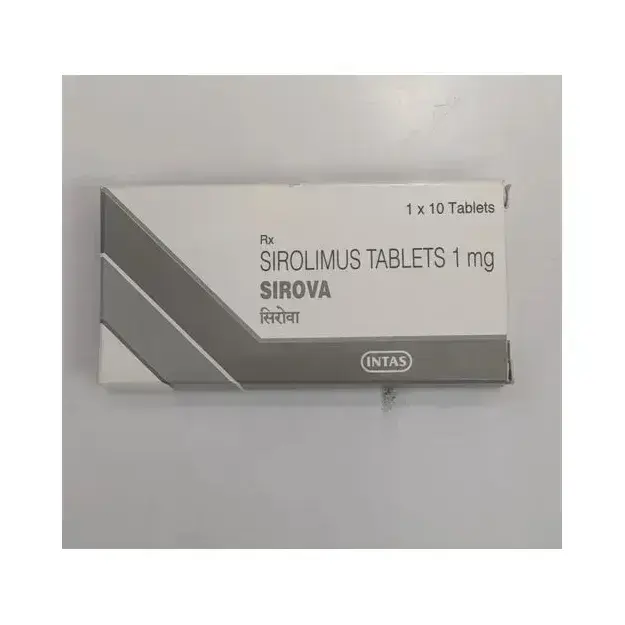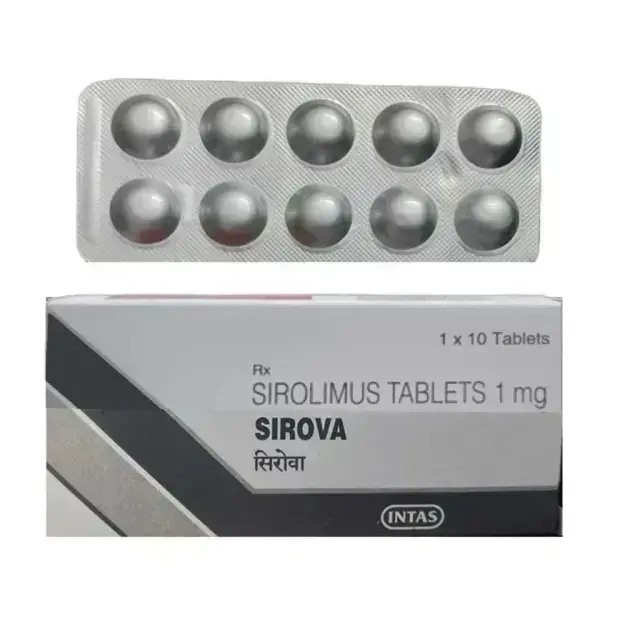Sirova contains Sirolimus, also known as rapamycin, is a macrolide compound with potent immunosuppressive and antiproliferative properties. Originally isolated from the bacterium Streptomyces hygroscopicus found on Easter Island (Rapa Nui) in 1972, it was initially developed as an antifungal agent. However, its significant immunosuppressive effects led to its primary use in preventing organ transplant rejection. Sirolimus is a versatile drug with applications spanning immunosuppression, vascular disease management, and potential therapeutic roles in various proliferative disorders. Its unique mechanism of action and evolving therapeutic uses continue to make it a subject of extensive clinical research.
Mechanism of Action
Sirolimus functions by inhibiting the mammalian target of rapamycin (mTOR), a crucial kinase in cell cycle regulation. By binding to the FK506-binding protein 12 (FKBP12), the sirolimus-FKBP12 complex inhibits mTOR, leading to reduced T-cell and B-cell proliferation. This action suppresses the immune response, making it effective in preventing organ rejection.
Medical Uses
-
Organ Transplantation: Sirolimus is primarily used to prevent organ rejection in patients aged 13 years or older receiving renal transplants. Its advantage over calcineurin inhibitors lies in its lower nephrotoxicity, making it suitable for patients at risk of kidney impairment.
-
Lymphangioleiomyomatosis (LAM): In 2015, the U.S. Food and Drug Administration (FDA) approved sirolimus for treating LAM, a rare lung disease characterized by the proliferation of smooth muscle-like cells, leading to lung damage. Sirolimus helps stabilize lung function in affected individuals.
-
Coronary Stent Coating: Sirolimus's antiproliferative properties are utilized in drug-eluting stents to prevent restenosis (re-narrowing of arteries) after angioplasty. The drug is released locally to inhibit cell proliferation, reducing the risk of artery blockage.
-
Vascular Malformations: Sirolimus has been used to treat complex vascular anomalies, including venous and lymphatic malformations. It can reduce lesion size, alleviate pain, and improve coagulation parameters in affected patients.
-
Tuberous Sclerosis Complex (TSC): Topical formulations of sirolimus have shown efficacy in treating facial angiofibromas associated with TSC, leading to significant improvements in skin lesions.
Dosage and Administration
Sirolimus is available in oral formulations, including tablets and solutions. The dosing regimen varies based on the indication, patient weight, and concomitant medications. Therapeutic drug monitoring is essential to maintain appropriate blood concentrations and minimize toxicity.
Side Effects
Common adverse effects include hyperlipidemia, hypertension, thrombocytopenia, anemia, delayed wound healing, mouth ulcers, and increased susceptibility to infections. Patients may also experience elevated liver enzymes and gastrointestinal disturbances. Long-term use has been associated with an increased risk of malignancies, particularly lymphoma and skin cancer.
Drug Interactions
Sirolimus is metabolized by the CYP3A4 enzyme and is a substrate of the P-glycoprotein (P-gp) efflux pump. Concomitant use of inhibitors or inducers of these proteins can alter sirolimus blood concentrations. For instance, CYP3A4 inhibitors like ketoconazole can increase sirolimus levels, while inducers like rifampin can decrease its levels.
Contraindications and Precautions
Sirolimus is contraindicated in patients with hypersensitivity to the drug or its components. Caution is advised in patients with hepatic impairment due to altered drug metabolism. Regular monitoring of blood counts, lipid profiles, and renal function is recommended during therapy. Patients should also be advised to limit sun exposure and use protective measures due to an increased risk of skin cancer.
X









